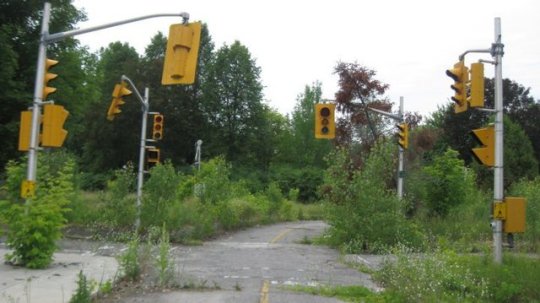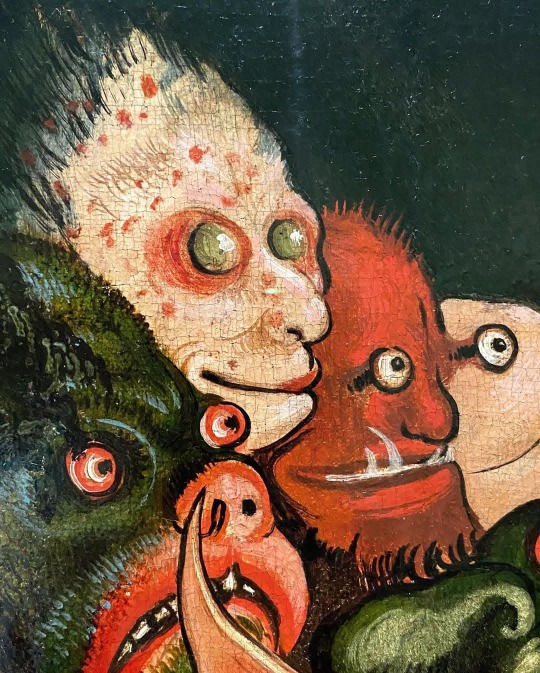Text
the goal for this year and for every year is to be kind and also to stop being scared of literally everything
32K notes
·
View notes
Text
Logged into Tumblr yesterday thinking to myself "it's been a while." Yeah, it'd been 3 months! Now catching up on the lives and interests of the IDK...handful?...people I follow who are still active. Sorry if I hearted about 1000 of your posts all in one go like some kind of weirdo!!
3 notes
·
View notes
Text
kibbe and all that other fashion guidelines shit is wrong. the real actual framework is a political alignment chart with the quadrants labeled "makes me feel comfortable" "makes me feel sexy" "makes me look cool to others" and "makes me look normal/nonthreatening to others". every outfit falls somewhere within this spectrum and you can maximize for each outcome at the expense of the others
2K notes
·
View notes
Text
The data does not support the assumption that all burned out people can “recover.” And when we fully appreciate what burnout signals in the body, and where it comes from on a social, economic, and psychological level, it should become clear to us that there’s nothing beneficial in returning to an unsustainable status quo.
The term “burned out” is sometimes used to simply mean “stressed” or “tired,” and many organizations benefit from framing the condition in such light terms. Short-term, casual burnout (like you might get after one particularly stressful work deadline, or following final exams) has a positive prognosis: within three months of enjoying a reduced workload and increased time for rest and leisure, 80% of mildly burned-out workers are able to make a full return to their jobs.
But there’s a lot of unanswered questions lurking behind this happy statistic. For instance, how many workers in this economy actually have the ability to take three months off work to focus on burnout recovery? What happens if a mildly burnt-out person does not get that rest, and has to keep toiling away as more deadlines pile up? And what is the point of returning to work if the job is going to remain as grueling and uncontrollable as it was when it first burned the worker out?
Burnout that is not treated swiftly can become far more severe. Clinical psychologist and burnout expert Arno van Dam writes that when left unattended (or forcibly pushed through), mild burnout can metastasize into clinical burnout, which the International Classification of Diseases defines as feelings of energy depletion, increased mental distance, and a reduced sense of personal agency. Clinically burned-out people are not only tired, they also feel detached from other people and no longer in control of their lives, in other words.
Unfortunately, clinical burnout has quite a dismal trajectory. Multiple studies by van Dam and others have found that clinical burnout sufferers may require a year or more of rest following treatment before they can feel better, and that some of burnout’s lingering effects don’t go away easily, if at all.
In one study conducted by Anita Eskildsen, for example, burnout sufferers continued to show memory and processing speed declines one year after burnout. Their cognitive processing skills improved slightly since seeking treatment, but the experience of having been burnt out had still left them operating significantly below their non-burned-out peers or their prior self, with no signs of bouncing back.
It took two years for subjects in one of van Dam’s studies to return to “normal” levels of involvement and competence at work. following an incident of clinical burnout. However, even after a multi-year recovery period they still performed worse than the non-burned-out control group on a cognitive task designed to test their planning and preparation abilities. Though they no longer qualified as clinically burned out, former burnout sufferers still reported greater exhaustion, fatigue, depression, and distress than controls.
In his review of the scientific literature, van Dam reports that anywhere from 25% to 50% of clinical burnout sufferers do not make a full recovery even four years after their illness. Studies generally find that burnout sufferers make most of their mental and physical health gains in the first year after treatment, but continue to underperform on neuropsychological tests for many years afterward, compared to control subjects who were never burned out.
People who have experienced burnout report worse memories, slower reaction times, less attentiveness, lower motivation, greater exhaustion, reduced work capability, and more negative health symptoms, long after their period of overwork has stopped. It’s as if burnout sufferers have fallen off their previous life trajectory, and cannot ever climb fully back up.
And that’s just among the people who receive some kind of treatment for their burnout and have the opportunity to rest. I found one study that followed burned-out teachers for seven years and reported over 14% of them remained highly burnt-out the entire time. These teachers continued feeling depersonalized, emotionally drained, ineffective, dizzy, sick to their stomachs, and desperate to leave their jobs for the better part of a decade. But they kept working in spite of it (or more likely, from a lack of other options), lowering their odds of ever healing all the while.
Van Dam observes that clinical burnout patients tend to suffer from an excess of perseverance, rather than the opposite: “Patients with clinical burnout…report that they ignored stress symptoms for several years,” he writes. “Living a stressful life was a normal condition for them. Some were not even aware of the stressfulness of their lives, until they collapsed.”
Instead of seeking help for workplace problems or reducing their workload, as most people do, clinical burnout sufferers typically push themselves through unpleasant circumstances and avoid asking for help. They’re also less likely to give up when placed under frustrating circumstances, instead throttling the gas in hopes that their problems can be fixed with extra effort. They become hyperactive, unable to rest or enjoy holidays, their bodies wired to treat work as the solution to every problem. It is only after living at this unrelenting pace for years that they tumble into severe burnout.
Among both masked Autistics and overworked employees, the people most likely to reach catastrophic, body-breaking levels of burnout are the people most primed to ignore their own physical boundaries for as long as possible. Clinical burnout sufferers work far past the point that virtually anyone else would ask for help, take a break, or stop caring about their work.
And when viewed from this perspective, we can see burnout as the saving grace of the compulsive workaholic — and the path to liberation for the masked disabled person who has nearly killed themselves trying to pass as a diligent worker bee.
I wrote about the latest data on burnout "recovery," and the similarities and differences between Autistic burnout and conventional clinical burnout. The full piece is free to read or have narrated to you in the Substack app at drdevonprice.substack.com
21K notes
·
View notes
Photo

Abandoned intersection near Ottawa. [720 × 404].
20K notes
·
View notes
Text

the girls
#i cannot believe how big this pup has gotten in 2 months?!#if you catch her at the right angle she looks as big as our 8yo
0 notes
Text
Unpopular opinion: the boomers were right. Smartphones are rotting our brains. And keeping us alienated from reality. We cannot actually process the amount of information that is mainlined directly into our eyeballs.
303 notes
·
View notes
Text
but i am an american so i must kill. im order to survive. if i don't kill them i will die. i don't think surviving is wrong. do you think im wrong for surviving? they deserved to die too. so i could live. did you know how difficult it was to kill? if anything i am the victim. the person i killed is gone but i have to carry these scars for my whole life. my life is a blessing on the earth don't you know why aren't you celebrating it? you must be a terrible person. i just thought about killing you.
12K notes
·
View notes
Text
these are demons btw and they look like a fun crew (source)


Anonymus, The Temptation of St. Anthony, detail, Rhenish School, 1520, Wallraf-Richartz-Museum, Cologne
386 notes
·
View notes
Text
i cannot wrap my brain around the fact that this is from the SIXTEENTH CENTURY

Water by Giuseppe Arcimboldo (1527 - 1593)
4K notes
·
View notes
Text
"The shift from the Afro-Caribbean zombie to the U.S. zombie is clear: in Caribbean folklore, people are scared of becoming zombies, whereas in U.S. narratives people are scared of zombies. This shift is significant because it maps the movement from the zombie as victim (Caribbean) to the zombie as an aggressive and terrifying monster who consumes human flesh (U.S.). In Haitian folklore, for instance, zombies do not physically threaten people; rather, the threat comes from the voduon practice whereby the sorcerer (master) subjugates the individual by robbing the victim of free will, language and cognition. The zombie is enslaved."
— Justin D. Edwards, "Mapping Tropical Gothic in the Americas" in Tropical Gothic in Literature and Culture.
Follow Diary of a Philosopher for more quotes!
35K notes
·
View notes
Text
i just think the substance is so overrated that it's making me mad how gaga people are over it. like was it a gorgeous-looking, grotesque movie? absolutely. did it have a single original thing to say? did it have a coherent plot? no and no.
also can we have just one role for an ~older~ woman in horror where the horror isn't either literally aging or a metaphor for aging or a side effect of aging???
#didn't help that we just watched the taking of deborah logan the other night#that was pretty all right though
1 note
·
View note
Text
idk when being negative/pessimistic/hater became so uncool. the world is really really bad, like wayyyy worse than you could even imagine, you dont have to pretend it's not. you can still enjoy things regardless of that while acknowledging that the world is really bad and people are more horrible than you could even imagine. 😐
324 notes
·
View notes
Link
This minimization keeps the quiet part quiet: that the world is still in a pandemic per the World Health Organization and that more than 73,000 Americans died of COVID in 2023, a higher number than from car accidents or influenza. Among those who have been infected, about 10 percent have long COVID, a serious and often disabling condition with a disease burden comparable to that of cancer or heart disease and an economic cost rivaling that of the Great Recession, for which there are no approved treatments. What’s more, each infection, no matter how mild, is associated with a substantially increased risk of health issues, including cognitive dysfunction, autoimmune disease and cardiovascular problems.
Prepandemic, these statistics would have been eye-popping. Now they constitute “back to normal.” We think we no longer have a problem, when we’ve just changed the standard by which we deem something concerning.
To shore up collective denial, we also rewrite the past. Not only do we repeat that we are better off now, we claim things were never that bad. Contesting the past to remove unwanted memories produces a cultural amnesia about the pandemic. And in burying the past, we sidestep accountability for what went wrong.
Truth tellers are the Achilles heel of collective denial because they call attention to what’s being ignored. Thus, another playbook tactic is to hush them up, often by painting them as subversives or deviants. And so those who wear masks are ridiculed, scientists reporting on COVID risks are cast as fearmongers, and those with long COVID are dismissed as having anxiety disorders.
#i still mask and people dont even ask why anymore theyre just like so when are you going to stop#and honestly idk if i will if circumstances don't change?#i don't miss random strangers seeing my face anyways thanks
3K notes
·
View notes
Text

11K notes
·
View notes
Text
I don't need Kamala's administration to build more houses. I need her to make the existing ones *affordable* for the average American income. THAT is the beginning of policy that is needed. AFFORDABLE home ownership. Or at least a federally implemented rent cap. I'd at least listen to that.
444 notes
·
View notes
